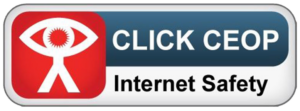LINKS
Online SafetyIt is important to know about how to keep safe online.
Online safety is something which we all need to consider. Just like in the real world, children are exposed to a variety of things whilst online.
Technology can provide great rewards to those that learn to use it well. It’s up to us as adults to make sure that these benefits are received whilst, at the same time the risks are limited.
This page provides information and links to various resources & websites which can offer help & advice in dealing with the possible risks and dangers online.
Here are some resources to help you.
Please could you let the Webmaster – [email protected] – if any of the following links do not work.
Child Exploitation and Online Protection
Are you worried about online sexual abuse or the way someone has been communicating with you online?
https://www.ceop.police.uk
Think U Know
How much do you know? Are you safe online?
They have made this website to help children aged 5 to 14+ to go on the internet in a safe way and know who to talk to if you are worried.
https://www.thinkuknow.co.uk
Childnet International
Childnet International is a non-profit organisation working with others to help make the internet a great and safe place for children.
https://www.childnet.com
UK Safer Internet Centre
The UK Safer Internet Centre is where you can find online safety tips, advice and resources to help children and young people stay safe online. It is the home of the annual “Safer Internet Day”.
http://www.saferinternet.org.uk
Parent Zone
Parent Zone are devoted to providing expert information to families, schools and family professionals. We create, curate and check the best available advice and information on all of the issues that are caused or amplified by the internet.Their mission is to improve outcomes for children in a digital world so:
- Children will be safer online.
- Children will be resilient enough to cope with the challenges of the online world.
- Children will be educated for a digital future.
ParentPort
ParentPort is run by the UK’s media regulators. They set and enforce standards across the media to protect children from inappropriate material.
Seen or heard something unsuitable for children? Maybe it was a programme on TV or online, a film, an advert, a video game or something in a magazine. At ParentPort you can find out about the standards that they expect from the media, make a complaint and share your views with them.
http://www.parentport.org.uk
Vodaphone Digital Parenting Advice
Brought to you by Vodafone, Digital Parenting helps you to get more involved with the technology that young people enjoy. Whether you’re a parent, a carer, a teacher or a teenager, it’s all about building children’s confidence and resilience so that they get the very best out of the fast-moving, awe-inspiring, sometimes-overwhelming digital world.
https://www.vodafone.com/content/parents
Vodafone’s Digital Parenting magazine has helped millions of families get to grips with the digital world.
Read their latest and past issues online – https://www.vodafone.com/content/digital-parenting/parents-and-carers/digital-parenting-magazine.html
How can I make my connected home more secure?
There things you can do to help make your connected home safer for your child:
- Do your research
Research different products online and read reviews. This is a great way to find out more about a product including age restrictions and credibility, as well as hearing directly from other parents.
- Read the manual:
Read the manual provided by the manufacturers. Information should be given about the privacy of the device, how it connects to the internet, and information about any app which may need to be downloaded in order to use the device.
- Set up parental controls:
Make use of the parental controls available on your home broadband and any internet enabled device in your home. You can find out more about how to use parental controls by visiting your broadband provider’s website, or by reading the Thinkuknow article about parental controls.
- Use safe search:
Enable the ‘SafeSearch’ function on your connected device and web search engines. This will allow you to limit the material your child can see when online. It is important to understand that no parental control or ‘SafeSearch’ function is 100% effective. This cannot be used alone to protect your child from accessing age-inappropriate material.
- Change the default password:
When you buy a connected device or toy,change the default password. Use a strong password that cannot easily be guessed and do not share this with others.
- Set your Bluetooth to ‘undiscoverable’:
Many connected devices are Bluetooth enabled. This means they are able to connect to nearby devices without having to connect to the internet. If the device has Bluetooth, set this to ‘undiscoverable’ so your child doesn’t share data or pair with an unknown device.
- Review and/or delete audio files:
Some connected devices or toys work by listening to your child’s voice commands, so these devices usually record and keep these audio files to work properly. Refer to the manual and find out how to review and/or delete audio files. If there’s a microphone on your child’s connected device, you can turn on the ‘mute’ button. This will stop the device from recording and storing audio files.
- Talk to your child:
Include connected devices in your online safety conversations, reinforcing the message that if your child sees or hears anything that makes them feel worried, they can speak to you or another adult they trust. Read further information on starting the conversation about online safety.
- Supervise your child:
If your child is primary school aged, supervise them when they are online or using a connected device. You should keep the connected devices your child uses in communal areas of the home such as in the kitchen or living room.
Useful Resources
- Online Safety Letter
- LGfL Six Top Tips to keep Primary kids safe online during a school closure
- Parent Online safety support April 2020
- Cyber Choices Introduction to the Computer Misuse Act 1990
- Cyber Choices Under 12 years old
- Cyber Choices 12 to 17 years old
Useful Links
- NSPCC
- Internet Matters – Parental Controls
- Kidsmart
- UK Safer Internet Centre
- CBBC – Own It: A place to help you boss your life online
- BBC Newsround – Advice and tips for staying safe online
- BBC Newsround – Internet safety: Caught in the Web – CBBC Newsround
- Vodafone Digital Parenting Advice
- PACE Child Sexual Exploitation free on-line course
- National On-line Safety Guides for Parents
- Three-Minute Briefing: The Momo Challenge
- LGBTQ+ Hub
- Parent’s Guide to Facebook
- Secret Conversations: everything you need to know about Facebook’s new feature
- TikTok: everything you need to know about the video production app
- Snapchat: everything you need to know about the social media platform
- Get Smart About P.L.A.Y. – AskAboutGames
- In-game chat: what parents need to know
- Harry Potter: Wizards Unite – what parents should know about the mobile game
- Staying safe on Minecraft
- Pokémon Go: a parent’s guide
- Live streaming: everything you need to know about the online phenomenon
- What is the Houseparty app and how does it work?
- The Parent’s Guide to Roblox
- The Parent’s Guide to Instagram
- The Parent’s Guide to Cyberbullying
- The Parent’s Guide to Snapchat
- The Parent’s Guide to Kik
- A Parent’s Guide to Mobile Phones
- Parent Zone.org – Parent Guides
- Connect Safely.org – Parent Guides
- Childnet: Moving on up! – Toolkit for young people aged 10-13 with the online aspects of moving to secondary school
Pupils
Extra Curricular Activities
Staff Members
Years Established
Get In Touch
Telephone: 01253 855215
Email: [email protected]

